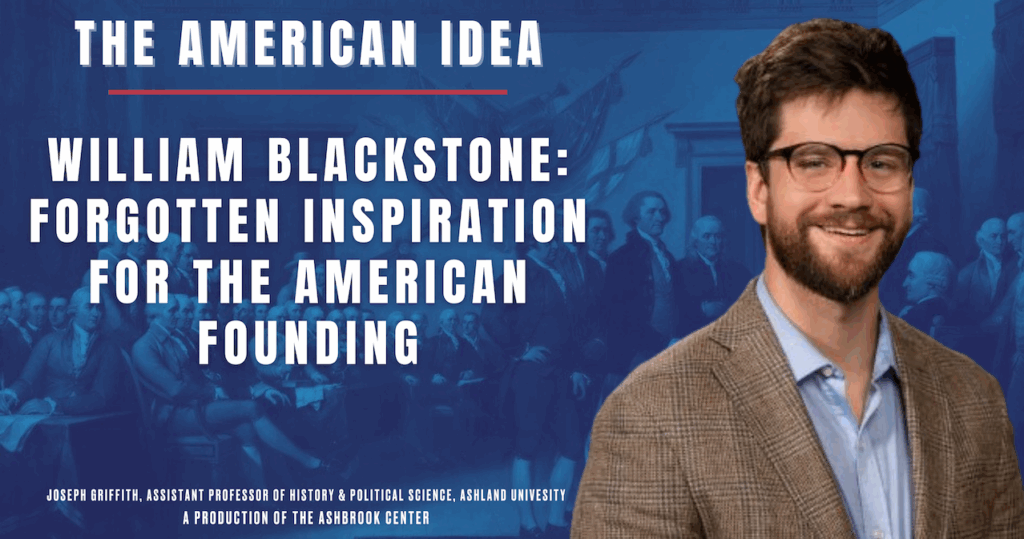William Blackstone: A Forgotten Inspiration for the American Founding
June 18, 2025

Listen and subscribe to the podcast
Join The American Idea’s Listener Email list – get news about upcoming episodes and a chance to offer questions for them, too!
When American revolutionaries gathered to forge a new nation, they carried with them the intellectual weight of centuries. Among the most influential voices guiding their deliberations was not a fellow colonial, but an English jurist whose systematic approach to law would prove foundational to American legal thinking. Sir William Blackstone, through his monumental “Commentaries on the Laws of England,” became the second most cited authority among the American founders—surpassed only by the Bible itself.
The Foundation of American Legal Education
Blackstone’s influence extended far beyond abstract constitutional theory into the practical realm of legal education and professional development. His structured, comprehensive examination of English law became essential reading for aspiring American lawyers, providing them with a coherent framework for understanding legal principles that had previously existed only in scattered precedents and statutes. James Madison, Alexander Hamilton, and Abraham Lincoln all cut their legal teeth on Blackstone’s methodical exposition, absorbing not merely specific legal doctrines but a way of thinking about law itself.
The genius of Blackstone’s approach lay in his ability to synthesize centuries of common law development into accessible principles. Rather than leaving future lawyers to navigate the labyrinthine maze of individual cases and Parliamentary acts, he offered a systematic understanding that could be applied to new situations. This educational foundation proved invaluable as American legal minds grappled with creating institutions for a society that was simultaneously rooted in English tradition and revolutionary in its aspirations.
Balancing Natural Rights with Practical Jurisprudence
Blackstone’s intellectual framework offered the American founders a sophisticated approach to one of their central challenges: how to ground law in universal principles while maintaining practical effectiveness. He acknowledged the fundamental importance of natural law and human rights as foundational concepts, yet cautioned against relying too heavily on abstract principles when addressing concrete legal disputes. This nuanced position provided American legal thinkers with a philosophical foundation that was both principled and pragmatic.
The English common law system that Blackstone championed had evolved through centuries of case-by-case development, creating a body of precedent that could adapt to new circumstances while maintaining continuity with established principles. This evolutionary approach appealed to American founders who sought to create lasting institutions without abandoning the flexibility necessary for a growing nation. Blackstone’s emphasis on judicial interpretation of established principles in contemporary contexts offered a model for how fundamental rights—such as privacy and property—could be applied to novel situations, from the advent of new technologies to the complexities of commercial development.
Constitutional Architecture and the Limits of Sovereignty
Perhaps nowhere was Blackstone’s influence more apparent than in the language and structure of the American Constitution itself. Technical legal terms that appear throughout the document—”habeas corpus,” “ex post facto” laws, and numerous other provisions—derive their meaning directly from Blackstone’s systematic definitions. The founders didn’t simply borrow isolated concepts; they adopted an entire vocabulary of constitutional governance that Blackstone had refined and clarified.
Yet the American experiment also represented a decisive departure from one of Blackstone’s central tenets: parliamentary sovereignty. While Blackstone viewed Parliament as supreme following the Glorious Revolution of 1688, and indeed opposed the American Revolution on these grounds, the American founders crafted a system of checks and balances that distributed power among three co-equal branches of government. This innovation demonstrated how Blackstone’s intellectual framework could inspire rather than constrain constitutional creativity.
The tension between Blackstone’s conservative approach to legal reform and American revolutionary aspirations proved productive rather than paralyzing. His cautious reformist philosophy—which emphasized gradual evolution of legal traditions to meet contemporary needs—provided a template for constitutional adaptation that valued stability while permitting necessary change.
The Philosophy of Unenumerated Rights
Alexander Hamilton’s argument in Federalist 84 reveals perhaps the most sophisticated application of Blackstone’s thinking to American constitutional theory. Drawing on Blackstone’s philosophical approach, Hamilton contended that the Constitution itself functioned as a comprehensive bill of rights by limiting governmental power rather than merely affirming specific individual liberties. This perspective, rooted in Blackstone’s understanding of natural rights, suggested that explicitly enumerating rights might paradoxically weaken them by implying that government possessed the authority to grant or restrict freedoms not specifically listed.
Blackstone’s emphasis on unenumerated rights emerging from historical tradition and common law development provided American courts with a framework for identifying fundamental liberties without resorting to arbitrary judicial assertion. This approach proved particularly influential in areas like parental rights, where Blackstone’s analysis of natural parental duties to protect, maintain, and educate children directly influenced landmark Supreme Court decisions in cases such as Pierce v. Society of Sisters and Meyer v. Nebraska.
The enduring power of Blackstone’s influence on American legal thought lies not in rigid adherence to his specific conclusions, but in the analytical framework he provided for thinking about law as both principled and practical, both rooted in tradition and capable of evolution. His systematic approach to legal reasoning offered American founders and their successors a way to navigate the perpetual tension between stability and change that defines constitutional governance. In crafting institutions designed to endure across generations while remaining responsive to contemporary needs, the American founders found in Blackstone not a master to be slavishly followed, but a guide whose methods could be adapted to serve revolutionary ends.

